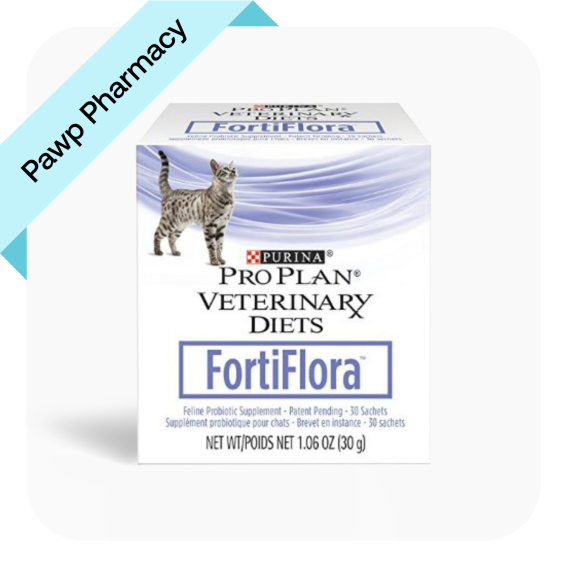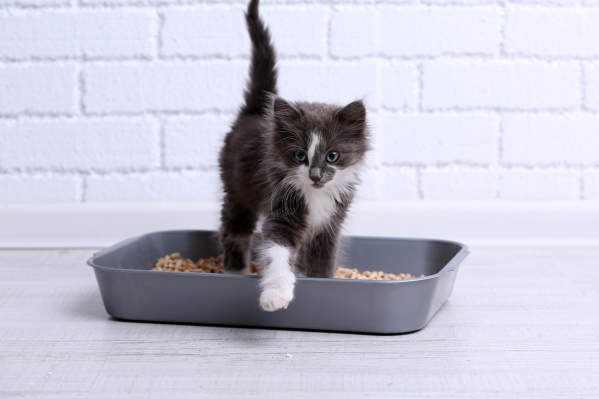As a pet parent of a new kitten, any change in behavior or health status can cause you to become worried. If you notice that your kitten has diarrhea, you might be concerned that something is wrong and wonder if they need medical attention.
There are a variety of causes for diarrhea in kittens. The good news is that some of them are simply just a result of being in an entirely new environment and eating new food. However, it’s also possible that the cause of your new kitten's diarrhea requires the attention of a vet.
Learn what could be causing your kitten's diarrhea, how you can help them, and when you should bring them to the vet.
What causes kitten diarrhea?
There are several potential causes of kitten diarrhea. These can include: food allergies or intolerances, transitioning to new food too rapidly, eating something they should not have (including human food), parasites, stress, and various medical conditions.
The causes of diarrhea in kittens typically fall into two categories: acute and chronic. It's important to note how long your kitten has been experiencing a gut upset and the severity of the diarrhea—this can help your veterinarian determine the cause and decide on the best course of treatment.
Causes of acute diarrhea in kittens
Young kittens with temporary cases of diarrhea fall into the acute category. This type of diarrhea can often be treated through a change in diet, reduction in environmental stressors, or medication.
The main causes of kitten diarrhea include:
Parasites
Food allergies and intolerances
New foods
Stress
Bacterial or viral infection
Parasites
According to Pawp veterinarian Dr. Sylvalyn Hammond, there is one very common cause of diarrhea in young kittens—intestinal parasites.
"Intestinal parasites are the most common cause of diarrhea in kittens," says Dr. Hammond. "Have your veterinarian check a stool sample to make sure your new kitten doesn’t have any worms in their gut."
It's important to get your new kitten on preventative medication and contact a vet if you notice worms in your kitten's stool.
Food allergies and intolerances
Diarrhea can be a sign that your new kitten's diet needs to be changed.
If your kitten has diarrhea or is vomiting after they eat, it can indicate that their system is not agreeing with some of the ingredients in their food. Your vet can help you choose appropriate food for your kitten to ensure they're getting all of the nutrients they need without causing GI upset.
Diarrhea can also be caused by your kitten consuming a non-food item.
New foods
If you try giving your kitten new food, you might find that they have diarrhea as a result.
It's important to be mindful about integrating new food into their diet. It's always best to start by giving your kitten a little bit of the new food mixed with their original food at first and see how they react to it. If they tolerate it well, slowly start to swap the old food out with the new food. You should try to do this over at least 5-7 days. Making this transition too quickly can cause gastrointestinal upset and issues like diarrhea and vomiting.
Stress
Another reason why your new cat might be experiencing a bout of diarrhea is due to stress. For example, if you bring your kitten to the clinic and notice that they're experiencing diarrhea when they return home, this could be attributed to stress.
You also might notice that your kitten has looser feces while they're adjusting to life at their new home or a new litter box situation.
This is often to be expected—but if it continues, it's wise to reach out to a vet. This will help you ensure that there's not a more serious underlying condition present.
Bacterial or viral infection
Your kitten may also have a bacterial or viral infection that's causing the diarrhea. This is one of the more serious causes for diarrhea in kittens. If this is the case, you may also notice abdominal pain, loss of appetite, watery, yellow, or bloody diarrhea, and vomiting.
Only a veterinarian will be able to diagnose a bacterial or viral infection in your kitten, so it's important to seek guidance from a medical professional to get your feline friend treated as soon as possible.
Causes of chronic diarrhea in kittens
If your kitten has been experiencing diarrhea for weeks or even months, this could be a sign of a more serious, chronic condition. You should seek veterinary care as soon as possible if this is the case.
Causes for chronic diarrhea include but are not limited to: Irritable Bowel Disease (IBD), lymphoma, an autoimmune disorder, or disease of the kidneys, liver, or intestines.
How to treat kitten diarrhea
If your kitten has diarrhea, you might wonder if there is something you can do to help. While some mild cases of diarrhea are certainly treatable at home, it’s best to get a professional’s opinion on your kitten's health status.
In addition to speaking to a vet about your kitten's diarrhea, you can also take the following steps.
Get your kitten vaccinated
There are some serious viral diseases that can have diarrhea as a symptom. It's very important to take your kitten to your vet for a health check within the first week of bringing them home and discuss the best vaccination schedule for your kitten’s specific needs. This can help prevent some of the diseases that can cause diarrhea.
Monitor them
Make sure that you're monitoring your kitten closely. If their symptoms get rapidly worse or if you notice that they have other symptoms like vomiting, poor or no appetite, and lethargy, you need to act quickly by taking them to a veterinarian for an examination and treatment.
Feed them a bland diet
Feeding a bland diet that is easy to digest can help rest the gut and allow it a chance to heal. Bland diets should contain a low-fat protein like boiled white meat chicken or turkey. This can be mixed with some white rice or sweet potato. You can try adding some canned pumpkin puree into the mix as well to increase the fiber content of the diet to help improve the consistency of the stool.
Kittens have very specific nutritional requirements for growth, so do not feed this diet on its own for more than 2 days. If you do need to feed a bland diet for a longer period of time, speak to your vet about feeding a specially formulated and fully balanced commercial intestinal diet.
Give them enough water
Make sure that your kitten has access to plenty of water when they're experiencing diarrhea. Your kitten could potentially experience dehydration due to diarrhea, and this could lead to more serious complications. Some kittens might prefer drinking running water, so try to encourage them to drink from a running tap or invest in a water fountain for cats. You can also try to add some extra water to their food or feed them some salt-free chicken or beef broth to try to encourage water intake.
Reduce stressors
If your kitten is a bit stressed in their new environment, you can take steps to help reduce this.
Make sure they have enough stimulation and comfortable places to sleep, hide and play. Try buying a cat tree, frequently change out toys, and ensure your kitten is properly socialized with both humans and other pets in the household.
Introduce kittens to the other pets in the household slowly by putting them in a closed room with their food and litter tray during the first few days. Alternate the room every day or two so they can get used to all the new smells and sights. You can also try to feed them on opposite sides of the door from the other pets in the household so they associate the sounds and smells of the other pets with something pleasant.
Pheromones can be of great help calming your new kitten and helping them integrate into their new home a little easier. Speak to your vet to learn more about these products and how they can help.
Give them a supplement
A veterinarian may suggest giving your kitten a probiotic supplement. These are specially formulated to promote normal gut health and balance and can be easily integrated into your kitten's diet.

FortiFlora Powder for Cats$29
Shop NowWhen to get veterinary help for kitten diarrhea
The most important thing to keep in mind when you have a kitten is that there’s never a wrong time to reach out to a vet. Not only will this provide you with peace of mind, but it will also help catch any potential problems quickly.
As a general rule of thumb, if diarrhea persists for longer than a day, you should bring your new kitten to the vet. If your pet is demonstrating other symptoms such as loss of appetite, lethargy, or vomiting, it’s absolutely necessary that a vet sees them sooner rather than later.
If you're concerned about your kitten’s diarrhea, you can always reach out to Pawp and our team of trained and trusted experts for more guidance.

Reviewed and fact-checked by
Dr. Mari, DVM at Pawp
